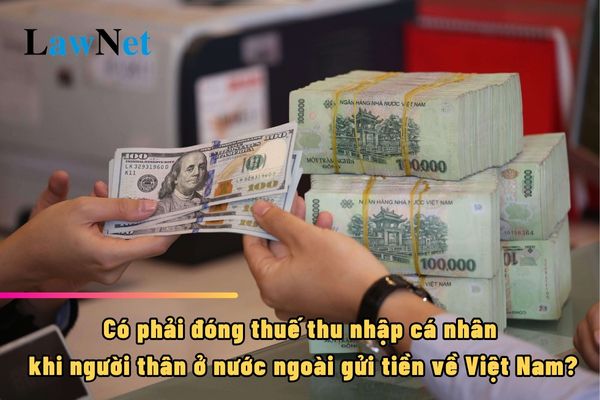Are incomes from foreign exchange remittances taxable in Vietnam?
Are incomes from foreign exchange remittances taxable in Vietnam?
Based on the provisions of Article 4 of Decree 65/2013/ND-CP (supplemented by Clause 6, Article 2 of Decree 12/2015/ND-CP) regarding tax-exempt income as follows:
Tax-Exempt Income
1. Income from real estate transfers (including housing and construction projects formed in the future as per real estate business laws) between: spouses; biological parents and children; adoptive parents and adopted children; parents-in-law and daughters-in-law; parents-in-law and sons-in-law; grandparents and grandchildren; and siblings.
2. Income from the transfer of residential houses, rights to use homestead land, and assets attached to homestead land of individuals in instances where the transferor possesses only one residential house or one homestead land right in Vietnam.
Individuals transferring only one residential house or homestead land right in Vietnam per this Clause must meet the following conditions:
a) At the time of transfer, the individual has ownership rights or use rights over only one residential house or one parcel (including ownership of said house or structure attached to the parcel);
b) The time the individual holds ownership or use rights over the house or land up to the point of transfer is at least 183 days;
c) The entire house or use rights of the homestead land are transferred;
The determination of ownership or use rights of houses or homestead land is based on the ownership certificate or property rights certificates for the relevant residential houses and homestead land. The individual transferring must declare and take legal responsibility for the accuracy of the declaration. If the competent authority identifies inaccuracies, tax exemption shall not be granted and penalties may apply.
3. Income from the value of land use rights assigned by the State without payment or reduced land levy as per laws.
4. Income from inheritance or gifts that include real estate (housing and forthcoming construction projects as per real estate business laws) between: spouses; biological parents and children; adoptive parents and adopted children; parents-in-law and daughters-in-law; parents-in-law and sons-in-law; grandparents and grandchildren; and siblings.
5. Income of households or individuals directly involved in agricultural, forestry, salt production, aquaculture, and fishery activities, provided these are not processed into other products or are simply processed.
Households or individuals engaged directly in the above production activities must meet the following conditions:
a) They must have legal rights to use land or water surfaces and directly engage in agricultural, forestry, salt production, or aquaculture labors. In the case of fishery activities, ownership or use rights over fishing vessels and active participation in fishing are required;
b) Residence at the local area where these production activities occur is mandatory, as per residence laws.
6. Income from the conversion of agricultural land granted by the State for production activities by households or individuals.
7. Income from interest on deposits with banks or credit institutions, and interest from life insurance contracts.
8. Income from remittances.
9. Additional compensation for night work or overtime wages that exceed daytime or standard working hours as per legal regulations.
10. Pensions paid by the Social Insurance Fund as per Social Insurance Law, and monthly pensions from voluntary pension funds. Individuals residing and working in Vietnam are exempt from taxes on pensions paid by foreign entities.
11. Income from scholarships that include:
a) Scholarships from the state budget;
b) Scholarships from domestic and international organizations (inclusive of living expenses) under the supporting and educational encouragement programs of those organizations.
12. Compensation from life insurance, non-life insurance, health insurance, work accident compensation, state compensation, and other compensations as per the law.
13. Income from charitable foundations sanctioned or recognized by competent state authorities, operating non-profit for humanitarian and charitable purposes.
14. Income from foreign aid for charitable and humanitarian purposes under Government and non-Government approvals by competent state authorities in Vietnam.
The Ministry of Finance shall provide procedures and documentation to determine tax-exempt incomes stipulated in this Article.
15. Income from wages and salaries received by Vietnamese ship crew members working for foreign shipping or Vietnamese international shipping companies;
16. Income earned by individuals who own, utilize, or work aboard vessels from providing goods and services supporting offshore fishery activities.
Thus, under the above regulations, income from remittances, i.e., money sent to Vietnam by relatives abroad, will be classified as tax-exempt income.

Are incomes from foreign exchange remittances taxable in Vietnam? (Image from the Internet)
What are regulations on personal income tax payers in Vietnam?
According to Article 2 of the Personal Income Tax Law 2007, the following subject to taxation:
- Personal income taxpayers are residents with taxable incomes stipulated in Article 3 of the Personal Income Tax Law 2007 generated within and outside Vietnam, and non-residents with taxable incomes stipulated in Article 3 of the Personal Income Tax Law 2007 generated within Vietnam.
- Residents are persons meeting one of the following conditions:
+ Present in Vietnam for 183 days or more in a calendar year or for 12 consecutive months from the first day of arrival in Vietnam;
+ Have regular residence in Vietnam, including registered permanent residence or rented accommodation per a lease contract in Vietnam.
- Non-residents are persons failing to meet the conditions specified in Clause 2, Article 2 of the Personal Income Tax Law 2007.
What are regulations on converting taxable Income to Vietnamese Dong?
According to Article 6 of the Personal Income Tax Law 2007:
- Taxable income received in foreign currencies must be converted to Vietnamese Dong at the average exchange rate on the interbank foreign exchange market announced by the State Bank of Vietnam at the time income arises.
- Taxable income received in non-monetary forms must be converted to Vietnamese Dong based on the market value of the products or services or similar or equivalent products or services at the time the income arises.

